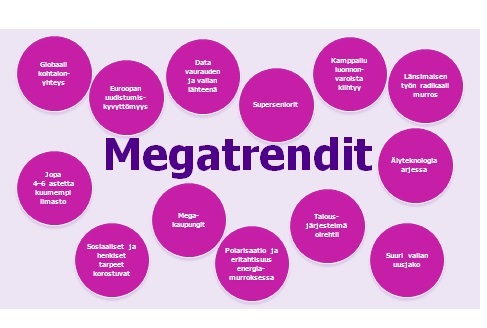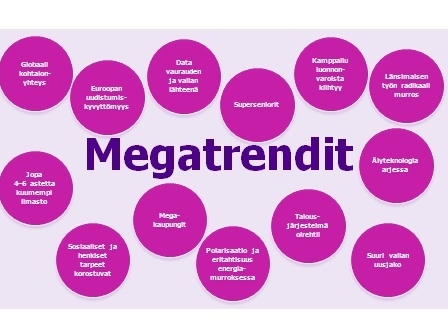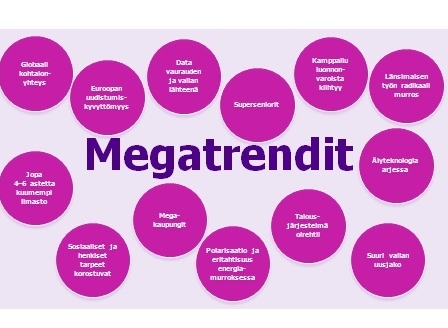This series of articles reviews the trends identified by Sitra during the autumn, from a variety of perspectives. Other articles in the series can be found under the Recommended banner on the right of the page.
Finland can point the way to regeneration for Europe – through its history. A brief industrial history may actually be an advantage for Finland, as Europe is faced with the necessity of renewal.
Sitra believes that Europe is in danger of permanently losing its impetus. “Europe’s inability to regenerate” is one of the issues on the list of trends published by Sitra in September 2013. Economic growth seems to have levelled off permanently in most of Europe. No-one wants to give up their advantages based on past growth, however. As the money runs out, nations will become more indebted and social tensions will increase.
Sitra can trace one of the problem’s roots back to the methods and attitudes of the industrial age. The rise of industrialisation led to a view of society as a bureaucratic machine generating well-being for the people. While it performed this task fairly reliably and securely, it also did so rather inflexibly. People did not have to worry much about taking responsibility for themselves.
The industrial era machine is now seizing up. This is a pan-European problem. Finland’s salvation may nevertheless lie in the fact that, here, the industrial age only really began after the Second World War. Memories of a different age are still alive in families and companies. Continuous renewal and flexible, experimental practices were everyday realities for people just a few decades ago.
“You only need to look back one or two generations, when people bore responsibility for their own lives. Every Finnish family contains anecdotes of this kind. The industrial age’s mode of thinking can certainly be unlearned,” says Sitra’s president Mikko Kosonen.
Sitra has put a great deal of work into charting the problems of the industrial age. The new list of trends includes phenomena such as “Radical Change in Western Work”, “Climate Hotter by up to 4–6 Degrees”, “Turbulent Economic System” and “Data as a Source of Power and Wealth”. Finland’s largest think-tank stresses the enormity of the problems rooted in the industrial age.
Kosonen himself has studied the petering out of industrial growth in more than 10 companies, including Nokia. Before working for Sitra, Kosonen was Nokia’s Strategy and Data Administration Manager. He had a close vantage point as Nokia became a prisoner of its own success.
“Success had toxic side effects in Nokia – it poisoned the company’s sense of realism. The results were tunnel vision, slow decision-making and waste of resources,” says Kosonen.
He says this has also happened to Europe. The industrial age was a golden era for the continent. Command and control were not a problem in a world of conveyor belts. Europe became a global yardstick of well-being. This success has now become toxic. Europeans believe that success and security will continue as long as they do nothing but try to preserve the lost world of yesterday. Kosonen compares the situation to that of the United States: “Over there, they consider renewal to be a prerequisite for security. The ability to regenerate is in their DNA. Creative destruction is set down in the constitution.”
Is there hope for Europe? Can society be made more willing to renew itself and be more tolerant of change? “This will not happen automatically at grass-roots level. And certainly not through dictates from above,” says Kosonen.
Well then, how? Sitra’s Vitality Forums have developed and tested concepts such as new models for work, communal democracy and new thinking with regard to security. The key idea is to combine grass-roots activity and experimentation with incentives and support from central government. Responsibility is shifted back to the individual. The weak will still be looked after, but this can only be done if society can regenerate.
Renewal is also required at the top. In Kosonen’s view, Finland would have a “theme-based administration”. In elections, people would vote for broad, value-based choices. The government programme would be a one-page record of the core winning values.
This is hugely different to the current Finnish model, in which government programmes are long compilations of the wishes of coalition partners and interest groups. According to Kosonen, the parties should reorganise themselves as large blocks. We will probably never see an American two-party system in Finland, but Kosonen looks to Europe for the model this time.
“In Sweden, political blocks offer clear choices to citizens during elections,” he says. For decades, Sweden has indeed been a pioneer in increasing freedom of choice in areas such as healthcare services and education. Some fear that welfare services will be run down in the name of regeneration. Are Sitra employees neoliberals, as is sometimes claimed?
“I hear that sometimes. The counter-argument to that is that a welfare society cannot solely be based on defending acquired privileges, but on providing people with meaningful participation. Welfare follows from participation, rather than having the state do everything on our behalf.”
Taneli Heikka
The author is a reporter and entrepreneur residing in the United States and preparing a doctoral thesis on digitalisation and democracy.
Related material:
BBC: In Graphics Eurozone Crisis
IMF: World Economic Outlook 2013
Kaikki yhden ja yksi kaikkien puolesta – Valtion konsernijohdon vaikea mutta mahdollinen tehtävä, Sitra, 2010 (in Finnish)
Kriisin jälkeen, toim. Rouvinen ja Ylä-Anttila, Etlatieto & Sitra, 2010 (in Finnish)
Kestämätön käy kalliiksi – 10 teesiä kestävään talouteen, Sitra 2013 (in Finnish)
Elinvoimainen Suomi, Sitra, 2010 (in Finnish)




Recommended